Author Archives: Children's Surgery International
First Days of Surgeries and Training – Tanzania 2018
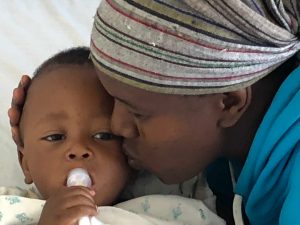
All I need to do is look in the parents’ eyes — that glassy stare says it all. In Swahili they would say, “asante kwa kutuamini,” thank you for trusting us.
Twenty children had life-changing surgery Monday and Tuesday, and the rest of the week’s schedule is filling up as well. We are proud to provide a level of care that’s standard at home but often inaccessible for people in one of the poorest countries in the world. And we’re here to help change that. We’re most proud to offer the local doctors and nurses training in surgical procedures and follow-up care so they can independently care for their patients. This is what drives us at CSI.
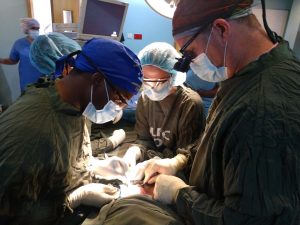
Tanzanian doctors and nurses observed, listened and learned both in and out of the OR. Dr. Siva Chinnadurai, CSI surgeon, spoke to the Arusha medical staff about cleft lip and palate surgery. CSI nurse educator Victoria Vandersteen will teach classes to the local nurses using a great resource developed by the World Health Organization and the American Academy of Pediatrics called Helping Babies Breathe. Pediatric urologists will give a Grand Rounds lecture to their Tanzanian colleagues. It’s what we do. It’s what we love.
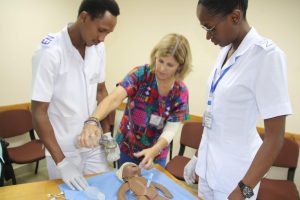
I never hear the CSI volunteers complain after working a 12-hour day without even taking time for lunch. We value every moment teaching and helping; putting our patients’ needs ahead of ours is simply part of our commitment.
One of our beautiful baby girl patient’s cleft lip was repaired and restored today, as Tanzanian physicians listened and learned. Tears streamed down the mother’s face as she saw her baby after surgery.
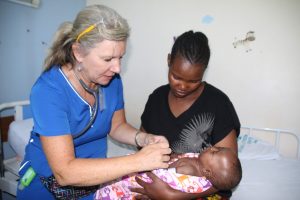
“Thank you, thank you,” expressed the families numerous times today.
I wish everyone could experience the peaceful feeling and empowerment of being part of making a dramatic difference in people’s lives. I am humbled. ~ Susan McMullan, CSI Medical Records volunteer
More photos here.
Our day of leisure – Tanzania 2018
On most CSI trips, especially where teams travel a great distance, we try to build in time to rest and explore the local sights, culture and natural beauty.
Tarangire National Park is a close safari location with unimaginable wildlife. Giraffes, elephants, lions (YOWZA! Don’t worry, we’re safe.), warthogs, ostriches, meerkats, gazelle, buffalo, zebras and wildebeests ran the African savannah in front of our shell-shocked eyes.
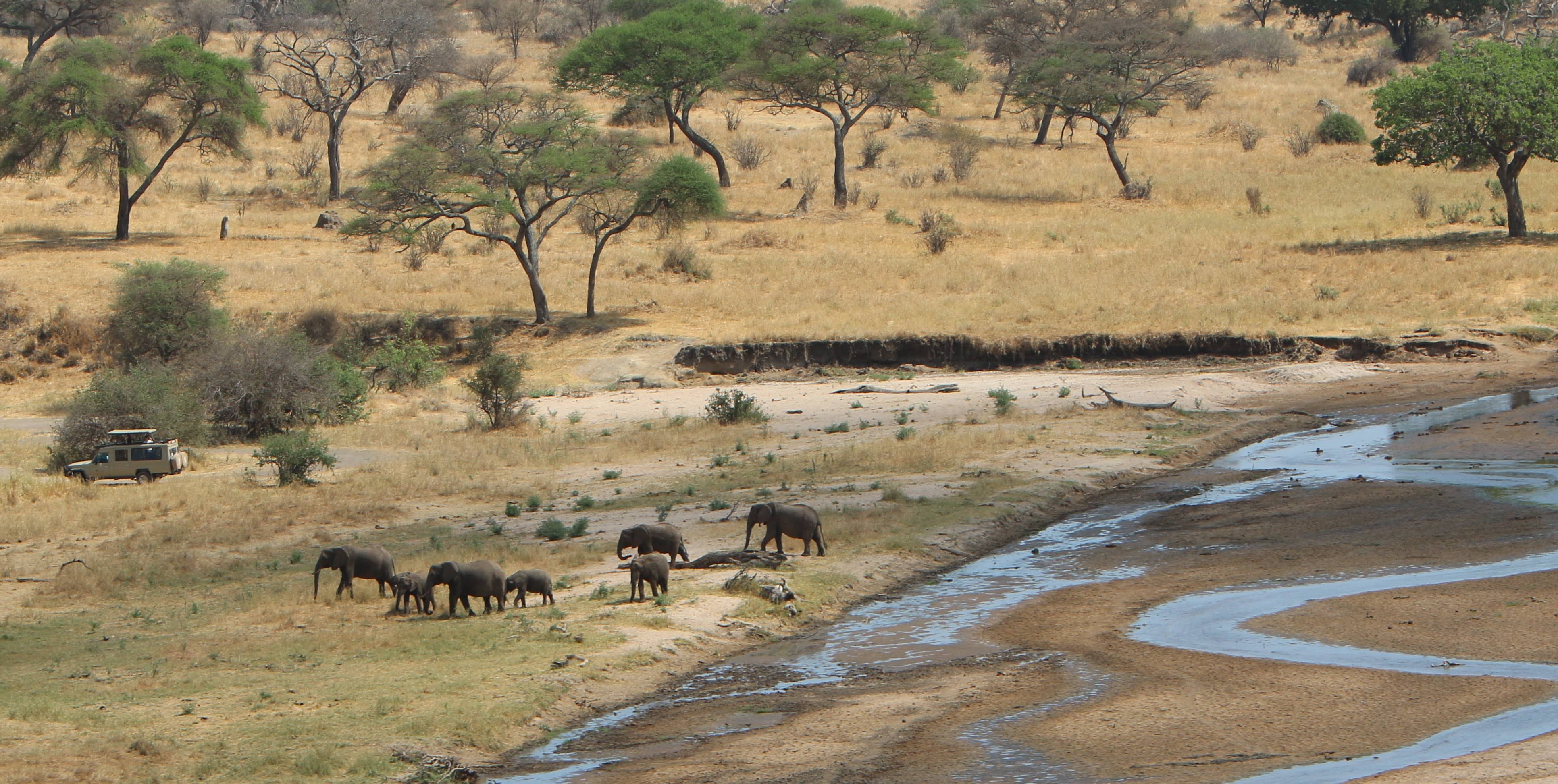
As a guide drove us over the bumpy terrain lined with walls of thorns and trees, we didn’t know which way to look first. Strong armies of elephants nourished themselves in the river that draws animals here during Africa’s dry season. Clever, lunch-stealing monkeys showed off the infants that clung tightly to their mothers.
I was dazzled when a herd of elephants paraded in front of our open-topped vehicle. Juma, our driver and guide, patiently waited as CSI nurse anesthetist John Erlandson snapped magnificent photos, close enough to capture the small details of a large animal. It felt like the elephants were waving hello to us with their enormous ears! I was reduced to a state of childlike wonder when I saw a baby elephant lovingly rubbing cheeks with her mom.

Baobabs, the iconic tree known as the Tree of Life, thunder over the vista of the African savannah. They are found only in Tanzania and Madagascar, and sometimes live for 2,000 years. I didn’t know they existed outside of Disney’s Animal Kingdom. Bird houses dangled from this magnificent tree like Christmas ornaments, a novel defense to keep predators away from their eggs.
We crossed the plains of burlap-colored grass where termite mounds popped out of the ground like small volcanos. There’s not much shade here, but the little we saw were the resting places for many of Africa’s infamous Big Five (lion, leopard, rhinoceros, elephant and Cape buffalo).
The dominant force of the Big Five is the lion. Tanzania is home to about half the lion population in the world. My heart thumped as we saw two of them napping in a giant pile, then two more that sauntered across the never-ending plain. They didn’t seem to care about having spectators. Visitors are not allowed to leave the vehicles, and the animals have become complacent with the daily human activity.
For six hours we stared at the animals. As we left, the long wavy grass bid us farewell.
Click for more photos from Tanzania.
Screening Day Success – Tanzania 2018
The challenges here in Tanzania at the Arusha Lutheran Medical Center (ALMC) are staggering. There are 50 million people in the country, but only 150 surgeons! The lack of sub-specialty doctors means general surgeons are used for surgical issues head-to-toe.
The CSI team is ready to help. Our focus at ALMC is to share our skills and knowledge — not take over their hospital. The team has assured the local staff that we will be sensitive to their culture and respectful of their practices. The CSI team, many with extensive experience on similar trips, have huge hearts and highly specialized training in their fields. They are eager to share their knowledge and experience with the local nurses and doctors.
The rhythm and routine of home quickly faded away when the CSI team screened 42 patients for potential surgeries. Many more patients will be evaluated and added to the surgery list this week. The patients not yet ready for surgery were sent to The Plaster House, a local facility similar to our Ronald McDonald house, to get the necessary support to be healthy for surgery in the future.
On screening day, the Tanzanian people flocked to us. Their emotion-rich voices and questioning eyes told the story. I could read the pain and hope in the parents’ eyes. They are the real heroes here. Families in economically deprived countries often have limited access to information and little means to travel. Against all odds they came with their medically fragile children — hoping for help.
I entered this experience raw, never before being a provider of care. I am humbled by the gratitude of the local people, and I am proud to be a part of this life-changing nonprofit organization. I am witnessing the transforming effects that CSI makes. My heart feels full, and we’ve only just begun.
~ Susan McMullan, CSI Medical Records Volunteer
We Made It! – Tanzania 2018
After 20 hours flight time without issues, our team arrived at Kilimanjaro International Airport. From the airport we traveled an hour by bus to the town of Arusha. Our exhaustion was fueled with adrenaline and we were all so happy to turn anticipation into reality.
If the location of Tanzania seems a little fuzzy to you, a point of reference is Jane Goodall who made her home here studying the chimpanzees. It’s also a trivia buff’s answer to, “Where is the tallest mountain in Africa?” You get an extra point if you can also name Mt. Kilimanjaro, which we missed seeing from our airplane because of the night time darkness. And that beautiful gem called Tanzanite, discovered near Arusha, can only be found here in Tanzania.
Tanzania lies on the equator. However, since the town of Arusha lies on the side of Mount Meru, which towers outside our hotel window at an elevation of 4600 feet, the temperatures resemble a typical Minnesota summer day.
They speak Swahili here, tho English is readily used. The CSI team has Tanzanian interpreters to bridge the language gap and ensure accuracy in a field where there is no room for error. In the meanwhile, a quick “Habari” hello made us feel kind of cool for the moment.
It’s going to be a big day today as we will meet the local medical staff, lay out our plans for the week, and screen patients to determine if they are candidates for surgery. We can hardly contain our smiles, just like some of our new little patients will soon be able to do too.
~ Susan McMullan, CSI Medical Records
On Our Way! – Tanzania 2018
As you are reading this, Children’s Surgery International volunteers are on their way to Arusha in Tanzania, Africa. Although CSI has been changing lives for children in third world countries for 17 years, this is CSI’s first trip to Tanzania.
Our 25 volunteers are focused on a specific mission at Arusha Lutheran Medical Center (ALMC): Teaching local doctors to perform surgeries and care for children with urological abnormalities, cleft lips and palates, and other head and neck abnormalities. In addition, our skilled nurses will work side by side with local Arusha nurses to help reinforce and build their skills.
Our surgeons will perform nearly 60 procedures free of charge on children who may otherwise never have this life-changing opportunity. In tandem, the Arusha medical team will gain hands-on experience as they become more self-sufficient. CSI plans to return to Tanzania regularly for the next several years to continue to teach and reinforce our work. Ultimately, we want to volunteer ourselves out of our jobs.
CSI’s journey of starting our surgical mission at a new site began long before our flight. Hundreds of volunteer hours combined with generous donations made this surgical trip possible. Our clinical lead, Norie Wilson, and CSI Medical Director Dr. Dave Tetzlaff visited ALMC in 2017 and determined this was a good fit for CSI. Volunteers packed and pre-shipped dozens of boxes of medical supplies to use this week and donate to our partners in Arusha. Temporary licenses were secured for medical volunteers, and flights and accommodations were arranged. To all who made this possible, our gratitude is deep.
This Minnesota-based, volunteer-driven organization has captured my heart. I’m a wide-eyed first-time volunteer whose job is to bring the stories home. I have the fire and desire to be a part of a team that can change the life of a child in a resource-poor environment. This child may be ostracized, isolated or rejected from society because of a medical condition that can readily be reversed. This is what CSI is all about.
Asante sana (thank you very much) to ALMC for opening your doors to us so that together we can change children’s lives.
Susan McMullan, CSI Volunteer
Wrapping up an amazing week… until next time!
Sally Lannin ~ CSI Team Member
What a trip! A huge success in every way possible and a perfect example of what CSI strives to do: come to an underserved country, find committed local medical and nursing staff who are literally starved for skills and training, model quality health delivery on all levels, and help build capacity. And here at this site, we have it all. Thanks in large part to Dr. Woubeshet Ayenew – a Minneapolis-based Ethiopian who knew of Felege Hiwot Referral Hospital and its needs – we found Dr. Melesse Gebeyehu, a surgeon born and raised in Bahir Dar, whose mission is to gain surgical excellence and impart it to other surgeons at Felege Hiwot Hospital.
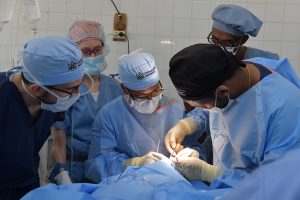
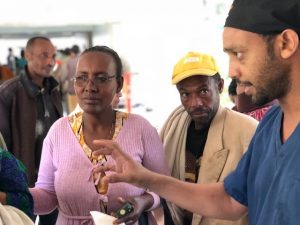
Tonight the entire team was invited to a thank you dinner hosted by top administrators at the College of Medicine and Health Sciences at Bahir Dar University which sits right next to the hospital. Medical students, residents and nurses in training have observed and participated in care as much as possible. There is a large shortage of Ethiopians going into nursing and some specialty areas which affects care. For example, in a U.S. post-surgical recovery area we have 1 or 2 medical staff assigned to every patient coming out of surgery. Here it’s 1 to every 8 patients. The farewell dinner was a great chance to discuss what could happen differently on our next trip to make CSI’s time here even more helpful.
If you had the chance to spend 15 minutes with us as a family walks up in the only clothes they own, with the child they value and love as much as we do our children, you would be shocked at the need. Mostly they live on rural farms without access to television and often even radio. They are farmers, and their hands tell the story of years of hard labor. Somehow, they get word of surgeries provided by teams of CSI volunteers working side by side with their Ethiopian counterparts. And it is free?!?! They take whatever transportation is available to make the 30-275 km trip, navigate the chaos in the halls of the hospital to find, finally, the right people to ask. This in and of itself is a miracle.
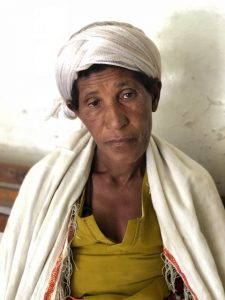
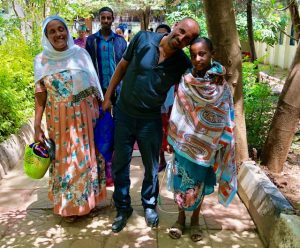
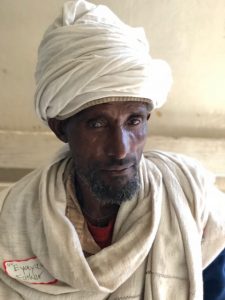
Take Metadel, a 15-year-old young man who after years of relentless mocking in school, dropped out altogether. His ‘friends’ said “…don’t get near Metadel or you will catch the contagious disease he got as a curse from God!”. Thankfully his 27-year-old brother asked a friend in Bahir Dar to let him know when CSI and the free surgeries were next in town. He got his younger brother Metadel to promise to return to school if he got surgery, took time off from his own work as a teacher, and travelled 80 km from their rural home to the ‘big city of Bahir Dar’ to find our screening line. After surgery both young men were speechless, with an outpouring of gratitude. Imagine – access to this surgery is the best thing that has ever happened in their lives and hopefully the turning point that gets Metadel back in school.
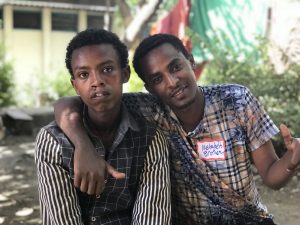
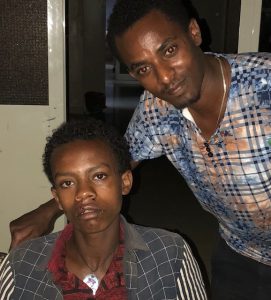
On our last day, as we wind up this mission of 59 surgeries, we refelct. We evaluated 88 patients on screening day and another 30+ who walked in each day. We especially want to thank our partner, Dr. Melesse – This soft-spoken surgeon is the backbone of our ability to weave a system of education and training here. He is skilled enough at this point to work in many places with far more prestige and pay, yet Dr. Melesse is fully committed to giving to the poorest people in his hometown of Bahir Dar. He works every day in utter chaos, with 50-60 patients waiting to see him in his clinics, for $600/month. Moonlighting a bit on the side to be able to afford to send his children to a private school, this fellow is amazing. He spoke of his gratitude to CSI at the dinner by saying “I just have no words to express how grateful we are for you people with whom we share nothing but a common caring for humanity, especially for these people of Ethiopia who have nothing.” Dr. Melesse was a product of public schools up until medical school and is ‘of the people’. He’s working on building the skills of his colleagues too – He has found fellowship opportunities in South Africa for 3 hospital surgeons to speed up their skill acquisition along with CSI’s visits twice a year.
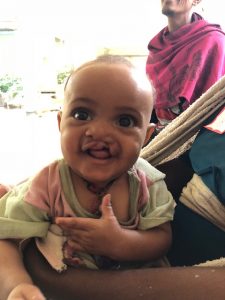
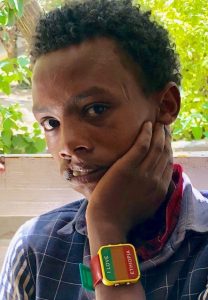
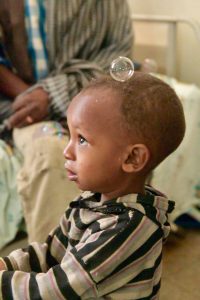
Our bags are packed, and we leave for the flight to Addis before our very late-night flights to various connecting cities to get back to the U.S. Every one of us has benefited from the ‘reboot’ this trip has given our own lives – perspective, appreciation and a commitment to do everything we can for these beautiful Ethiopian people.
A Picture is Worth a Thousand Words
From CSI Team Member and photographer, Tom Northenscold
A face I will never forget. This teenage girl suffered taunts all her life over her cleft lip. While the surgeons cannot take away that pain, they can repair her cleft lip in a masterful way.
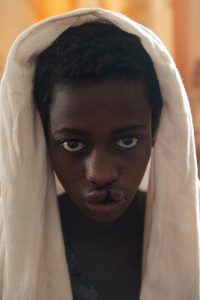
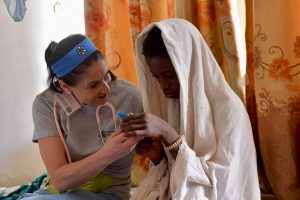
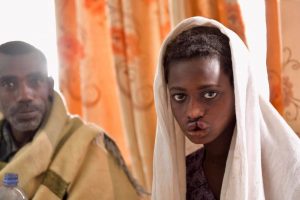
Wednesday – Lube Tech Brings Smiles
Margaux McClure ~ CSI Team Member
Philanthropy Coordinator at Lubrication Technologies Inc.
It’s truly another world here in Bahir Dar. Today we saw a man come in with an arrow going straight through his arm. He sat the entire day patiently waiting for help. Being non-medical, I have never seen anything like this, let alone watch a surgery take place. I feel so blessed to be here and have this experience. Each day I think it will become less shocking, less miraculous – and each day never ceases to wow me. I watch in awe as our unbelievable medical team nonchalantly changes lives – brushing it off like it’s no big thing. They’ve been giving me small jobs like holding the babies after surgery and calming them as they wake up, yearning for their mothers. They want me to feel important, they’re the real heroes though.
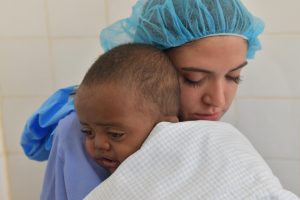
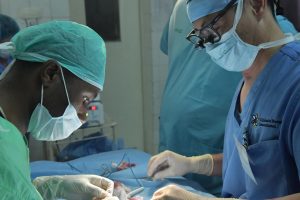
Today marks the kick-off of our official Lube-Tech Half-Day of Smiles. Employees at my company have been hard at work for the past month to raise enough money to sponsor a half day of CSI’s week here in Ethiopia. This amounts to about 9 life-changing surgeries plus the medical training that goes with them. I need to give a shout out to Lube-Tech employees, husband and wife, Cathy and Mark Morse. They selflessly put on an entire fundraising lunch for our company with a free-will donation option. Cathy and Mark worked tirelessly, staying up nearly all night to purchase and prepare all the food; spending their own money; and using their personal time off to execute the lunch. They were able to raise a total of $1,200! Cathy also put together a Lube-Tech Cookbook that employees could buy – the proceeds all went towards our fundraiser to help these kids and families here in Ethiopia. Thank you, Cathy and Mark – I wish you could be here to experience the difference you are making in these children’s lives as it is something quite special!
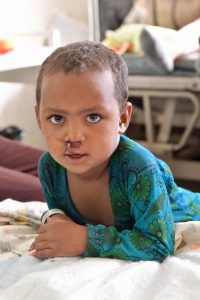
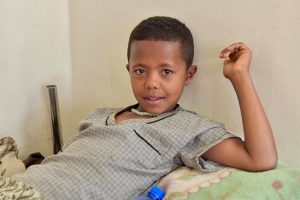
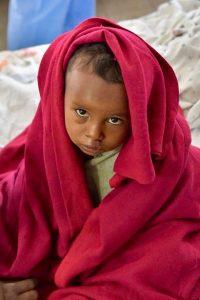
Celeste, one of the CSI nurse anesthetists, made huge strides with two Ethiopian anesthesia providers today. The two Ethiopian anesthesia providers worked side by side with Celeste, who was pleased with the opportunity to work with them. Celeste says their collaboration will help to enhance patient care in the long run!
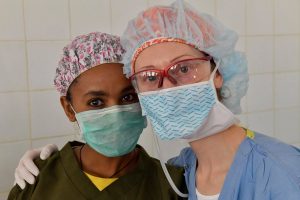
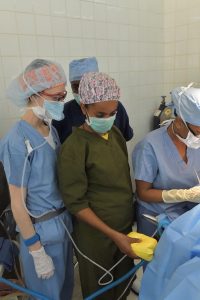
I’ve always hated going to the doctor, but after this week I see how much respect I owe the medical profession and how fortunate we are in the U.S. with our healthcare system. I strive hard to not fall for the perpetual curse of American ethnocentricity, but when it comes our medical knowledge and expertise, we are doing something right!
Waiting, Hoping, Praying
Sally Lannin ~ CSI Team Member
Surgery day two: We arrived again to a jam-packed hallway – a combination of our registered patients, hopeful potential patients, and an assortment of supportive fathers, grandmothers, best friends who helped those in need find their way to us.
At the gateway point here the Medical Records station greets each person who comes through; today a man and his daughter with a cleft arrived after walking 9 hours to reach a bus which took them most of another day to get to the hospital.
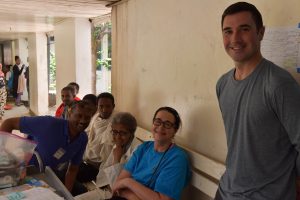
Eyayaw, a 25-year-old young man whose aunt lives in Bahir Dar heard CSI was coming to town. He came by bus despite living 200 km away. He was born with a partial cleft and has been mocked since he was a child. He said he feels “lots of happiness” now that his lip will be fixed. He said “kids here give you all kinds of names like “split lip”. His father is a priest who accompanied him, praying for a safe and positive outcome while his son was in surgery. After surgery the first thing he asked for was a small shard of mirror to see the results. Eyayaw hopes to go to University of Bahir Dar and study Economics.
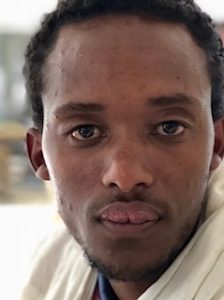
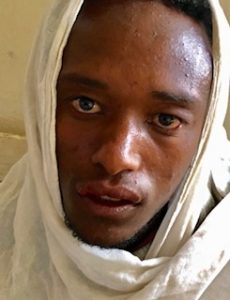
Waiting – Hoping – Praying
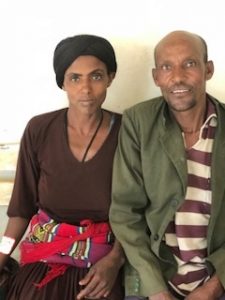
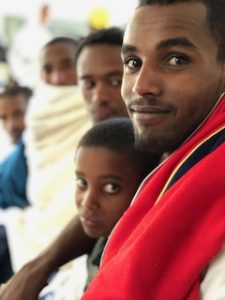
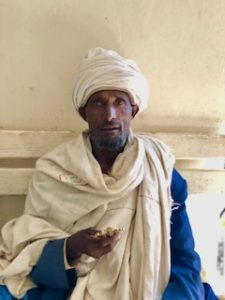
Today we also had a mother, who’d given birth just hours before, arrive with her baby boy and his cleft lip and palate. Too young for surgery this week, patient educator Jan Gauger taught the family how to feed the newborn using a special bottle.
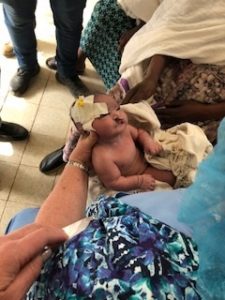
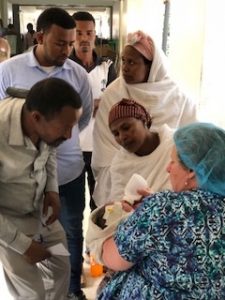
Tiny miracles are many per hour in a place like this. But so are the heartbreaks. Very poor, in threadbare clothes, these beautiful Ethiopian people work very hard for things we take for granted: clean water, electricity that stays on, clean hospitals are all not part of their lives. I saw a hospital patient have the head of his bed raised by putting a giant rock under the flimsy foam rubber that was his bed. But despite the hardships, people readily share, say “hello” as you pass by, wave and smile.
And what smiles! Absolutely amazing.
Surgery Day 1 – Complete
Karen Jordan ~ CSI Team Member
Whew the last two patients are in surgery as I type at 4:45 pm. The first day of surgery is coming to an end and it has been overwhelming yet fulfilling, chaotic yet successful, and heartbreaking yet heartwarming. The day started bright and early after a night of sporadic electrical outages. The surgical teams headed over first to get ready for the day, followed by medical records and the pediatric team. We were greeted by a crowd of patients and their families, in addition to dozens of people hoping to be added to the surgery schedule. As we were trying to get everyone organized, the surgeons and nurses were trying to find basic items like sanitary wipes while testing their spur of the moment solution to missing shoe covers (shower caps over their shoes).
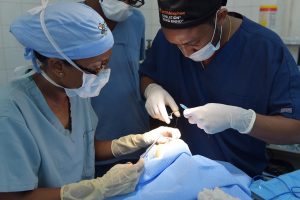
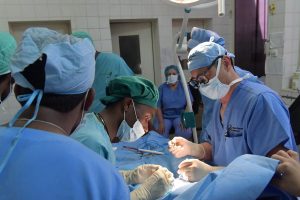
The first operations started around 8:45. While it eased a bit of the chaos outside, we were still dealing with figuring out who was who and tracking down missing patients. My heart went out to the little ones who hadn’t eaten or drank anything since midnight and you could see how difficult it was for their mothers to not breastfeed them. With 13 operations scheduled, we had to complete intake for the day then turn our attention to the more than 20 families who arrived hoping to be added to the week’s schedule. Unfortunately, many of them had to be told to return for CSI’s next trip in the Fall, however 12 were screened and the surgeons will try to add them to an already full week. Many of these families were waiting for us when we arrived at 7:20 and we were finally able to get them seen by the surgeons and pediatricians at the end of the day. It was amazing to see how patient these young children were with no toys or video games or iPads to keep them occupied.
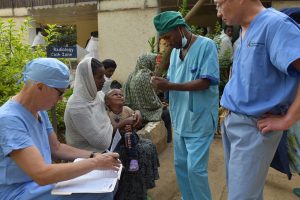
I took a break from the medical records charts to spend a couple of hours playing with the waiting children. They are all adorable, smart and willing to make friends at the drop of a hat. I was cranking out origami balls and birds and even the youngest wanted to help make them while the older ones quickly learned how to fold the shapes themselves. We moved on to cat’s cradle and, the universal smile-getter, bubbles. It was wonderful seeing their smiles and hearing them laugh given the grim surroundings of the hospital environment and the concerned families.
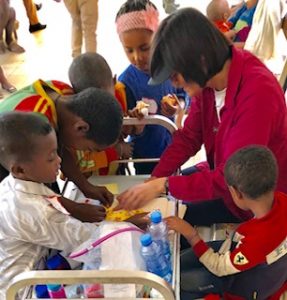
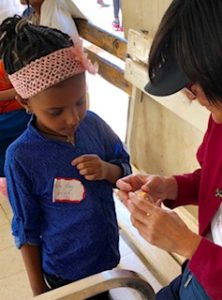
I was nabbed by one surgeon who had been referred to a current patient in the hospital—a 25-day old baby in NICU who needed attention from our urology surgeons. We went to NICU which turned out to be a gurney in the outdoor hallway. Thankfully the surgeons were able to add the baby to the schedule at the end of the day. His mother sat across from me with tears silently rolling down her face; can you imagine giving your 25-day old baby to a set of strangers who don’t even speak your language for an operation? Her joy and relief when he emerged sleepy and safe were memorable.
The surgeries aren’t the only value CSI brings to the Ethiopians. One young mother brought her baby who had been born yesterday but couldn’t nurse because of its cleft lip. Although the baby was much too young to be operated on, the team mobilized to produce special bottles designed for cleft lip babies who can’t produce enough suction to nurse successfully. James, CSI logistics lead, ran into town to buy some formula for the baby and Jan, CSI nurse educator, spent 45 minutes instructing the family how to mix the formula and use the bottle. The relief on the family’s faces when the baby could finally drink the formula was evident. Although this sounds simple, we had seen a seven-month old baby on Saturday when we were doing screening who hadn’t gained any weight since birth due to its cleft palate. It brought home to me the many ways CSI impacts lives here.
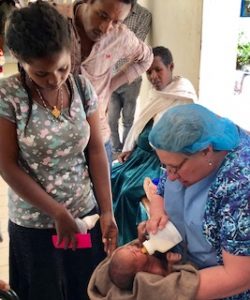
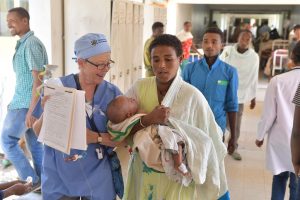
We barely had time to eat or drink but I wouldn’t have traded today’s experiences for the world. I’ve had an intimate glimpse into these families lives and I have seen firsthand the impact CSI’s dedicated medical team make for these patients. The best feeling was watching the doctors walk out with babies in their arms after a successful surgery and hand them into their parents’ arms, safe and sound and healthier than before. I remain deeply impressed by the CSI team here—their dedication and hard work under very difficult conditions, their flexibility and creative solutions to challenges, and their warm and deep compassion and care for the patients and their families are inspiring. I can’t wait for day two!
Karen Jordan, CSI partner and volunteer, assigned to support Medical Records and loving the experience!
